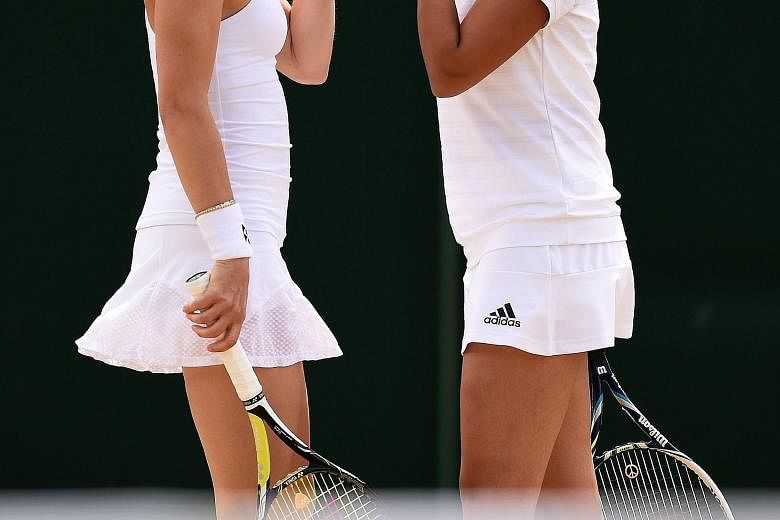LONDON • For Martina Hingis, it was a return. For Sania Mirza, it was a breakthrough.
Hingis and Mirza, the top seeds in the women's doubles draw at Wimbledon, beat Ekaterina Makarova and Elena Vesnina 5-7, 7-6 (7-4), 7-5 in Saturday's final.
The second-seeded Russians had led 5-2 in the third set before Hingis and Mirza stormed back, reeling off five straight games before being interrupted at 5-5, when the Centre Court roof was closed because of fading light.
Hingis, 34, served out the win to love, and when Vesnina's final return hit the net, Hingis and Mirza leapt into each other's arms.
"I always believed in it," Hingis said of her ability to reach the top of the sport again. She retired in 2007 and returned to the tour two years ago after being inducted into the International Tennis Hall of Fame.
The title is her first in a Grand Slam since 2002, when she won the women's doubles at the Australian Open with Anna Kournikova. It is the Swiss' 10th career Grand Slam women's doubles title, the first having come at Wimbledon 19 years ago, when she was 15.
Mirza, 28, now has a long-awaited maiden Grand Slam title in women's doubles in a career full of firsts for women's sport in India.
Even in the often overlooked realm of doubles, Mirza has maintained a presence as one of her country's most famous female athletes. She has faced scrutiny surpassing those faced by many top singles players, including criticism early in her career from Indian Muslim clerics, who thought she should not wear a skirt while playing.
"I never said I was a perfect Muslim; I just said I was a practising one," she said. "They couldn't handle the fact that I was non-apologetic about the fact that I was a woman, and that I don't really care what you think of me playing tennis."
From the outset, her path as an elite tennis player was an unlikely one. The courts she played on as a child were made of cow manure. She also faced opposition from members of her extended family.
"When I was 11, 12, they said, 'What is wrong with you guys? Do you really think she's going to play Wimbledon? That's for people from outside this world.' It was that kind of attitude. A lot of people later came back to us and apologised, because they were family."
With her success and outspokenness, Mirza has inspired many young girls in a region where sport is often an option only for boys.
"Every time I step on the court, I'm doing things no Indian woman has done, in tennis or in sport, back home or in that part of the world," she said. "I would like to think that I've inspired a few girls to pick up tennis rackets - not just tennis rackets, but to do whatever they believe in which is out of the box, so to say."
Though she understands the larger significance of her playing, Mirza said, she plays first and foremost for herself.
"I'm trying to win because we want to win. This is what we play for. I hope it inspires a lot of girls, and makes them believe they can be Grand Slam champions, too." NEW YORK TIMES

